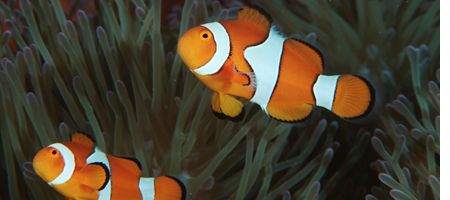The increasing amount of dissolved carbon dioxide oceans is driving fish crazy, Australian researchers say.

At the levels predicted for the oceans by the end of this centory, it will interfere with their ability to hear, smell, turn and evade predators, says Professor Phillip Munday of the ARC Centre of Excellence for Coral Reef Studies and James Cook University.
“For several years our team have been testing the performance of baby coral fishes in sea water containing higher levels of dissolved CO2 – and it is now pretty clear that they sustain significant disruption to their central nervous system, which is likely to impair their chances of survival,” he says.
Munday’s team says that high CO2 levels in sea water disrupt a key brain receptor in fish, causing marked changes in their behaviour and sensory ability.
“We’ve found that elevated CO2 in the oceans can directly interfere with fish neurotransmitter functions, which poses a direct and previously unknown threat to sea life,” he says.
After studying how baby clown and damsel fishes performed alongside their predators in CO2-enriched water, the team found that, while the predators were somewhat affected, the baby fish suffered much higher rates of attrition.
“Our early work showed that the sense of smell of baby fish was harmed by higher CO2 in the water – meaning they found it harder to locate a reef to settle on or detect the warning smell of a predator fish. But we suspected there was much more to it than the loss of ability to smell,” says Munday.
The fishes’ sense of hearing was also impaired, meaning that they no longer avoided reef sounds during the day – making them much more vulnerable to predators.
The fish also tended to lose their natural instinct to turn left or right – an important factor in schooling behaviour which also makes them more vulnerable, as lone fish are easily eaten by predators.
“All this led us to suspect it wasn’t simply damage to their individual enses that was going on – but rather, that higher levels of carbon dioxide were affecting their whole central nervous system,” says Munday.
The reason appears to be that high CO2 directly stimulates a receptor in the fish brain called GABA-A, leading to a reversal in its normal function and over-excitement of certain nerve signals.
While most animals with brains have GABA-A receptors, the team considers the effects of elevated CO2 are likely to be most felt by those living in water, as they have lower blood CO2 levels normally. The main impact is likely to be felt by some crustaceans and by fishes, especially those which use a lot of oxygen.
Prof. Munday said that around 2.3 billion tonnes of human CO2 emissions dissolve into the world’s oceans every year, causing changes in the chemical environment of the water in which fish and other species live.
“We’ve now established it isn’t simply the acidification of the oceans that is causing disruption – as is the case with shellfish and plankton with chalky skeletons – but the actual dissolved CO2 itself is damaging the fishes’ nervous systems.”





